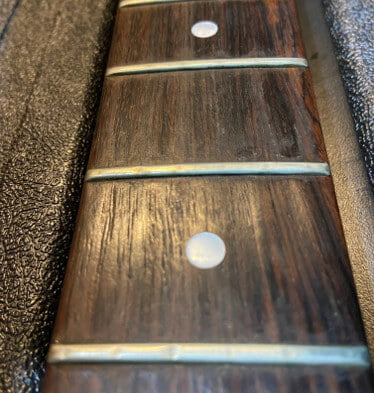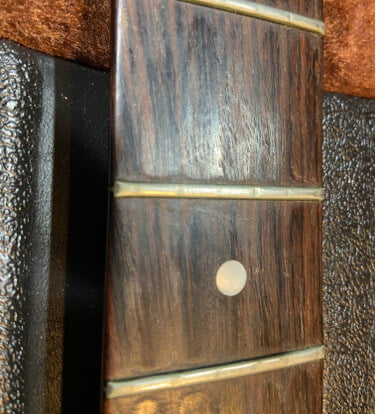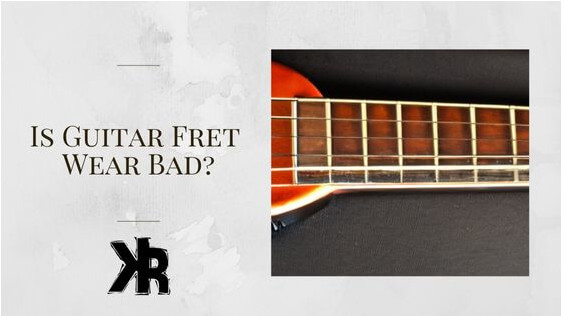Table of Contents
As a guitar player, there is nothing worse than an instrument with issues that deem it unplayable. There are many things that can happen to kill your inspiration to play it. The frets on your guitar can turn a good experience into a very frustrating one. But is fret wear bad, and how so?
Like anything, frets wear when used. When your guitar begins to make buzzing noises and the notes sound dead, your frets might be worn out. This is recognizable by the divots and imperfections seen in worn frets.
As time goes by, your guitar frets begin to wear, dent, and form divots that affect the way it performs. This can create odd noises and sustain issues. This Killer Rig article will explain what to look for and how to correct it.
What Causes Fret Wear?
Fret wear is influenced by several factors. Understanding these factors can help in taking preventive measures to minimize wear.
Friction Between Strings and Frets
The primary cause of fret wear is friction. When you press a string against a fret, metal contacts metal. This repetitive action gradually wears down the frets, altering their shape over time.
Type of Strings
The material of the strings plays a significant role in fret wear. Harder materials, such as stainless steel strings, can cause more wear compared to softer materials like nickel-wound strings.
Playing Style
The way you play the guitar also contributes to fret wear. Techniques that involve heavy string bending, tapping, or frequent use of a capo exert additional pressure on the frets, leading to faster wear.
Environmental Conditions
Humidity and temperature can affect the wood of the fretboard, which in turn influences the rate of fret wear. Both high and low levels of humidity can have adverse effects.
Frequency of Use
The more frequently the guitar is played, the quicker the frets will wear down. A guitar that is used daily will naturally experience more wear compared to one that is played less often.

How Much Fret Wear is Too Much?
Determining the extent of fret wear that is considered “too much” is crucial for both the playability and longevity of your guitar.
Excessive fret wear can lead to a variety of issues that affect the instrument’s performance. Here are some key indicators that your fret wear has reached a concerning level:
- Deep Grooves or Divots: If you notice that your frets have deep grooves, especially in areas where you frequently play chords, this is a sign of excessive wear.
- String Rattle and Buzzing: When the frets are worn down significantly, you may experience string rattle or buzzing sounds. This affects the clarity of the notes you play.
- Intonation Problems: If your guitar is hard to tune or goes out of tune quickly, worn frets may be affecting the instrument’s intonation.
- Functional Impairments: Difficulty in pressing down on the strings or experiencing muted notes are signs that the frets are overly worn.
- Professional Assessment: When in doubt, consult a professional. They can measure the frets and provide expert advice on whether repair or replacement is needed.
If you’re experiencing any of these issues, it’s likely that your fret wear has reached a level that requires attention. Options for remediation range from minor adjustments to complete refretting, depending on the severity of the wear.
How to Prevent Fret Wear
So how can we prevent them from wearing out prematurely? There are a few things that can be done to help prolong their life span. First begin by looking into your play style.
Do you press really hard on the strings? What materials are your frets and other parts? Let’s see what we can do to improve the longevity.
Excessive Pressure On The Strings
There is a point at which excessive pressure can be applied to the strings. Not only is it not necessary, but will wear your frets faster. There are many newer players who are learning the feel of the guitar. This can take quite some time to figure out.
Normally, it’s only natural to apply a great deal of downward pressure to the strings.
Over time, work on applying less pressure. Obviously, you want to make sure you are fretting the string correctly in order to get it to sound right. But learn to apply only the amount of pressure needed to get the note to sound right.
This will prevent excessive wear to the guitar frets. But it will also help you become a faster player. There is less pressure to release in your hands between changes.
Have Your Guitar Maintained
If your guitar is not set up right, it may require you to press hard on the strings. You want to make sure your guitar is in optimal shape. Strings being farther from the fretboard and tuning problems can also create wear.
We tend to then adjust our play style to a guitar that is not set up and become more aggressive in our techniques. A properly set-up guitar only requires a light touch, which helps keep it in good shape altogether!
Keep Your Guitar Clean
Whenever you are finished playing your guitar, make sure to give the strings and fret board a good cleaning. Dirt, grime and oils from our hands all come together and create more friction.
Over time, it will not only dull our strings but create additional wear to the guitar frets. Find yourself a good and easy cleaning device like the Music Nomad String care Kit. The easier the cleaner is to use, the more likely you are to use it.
The benefit in cleaning our guitar is quite large! Not only do they clean, but they also lubricate, which helps prolong fret and string life!
If you have rusty strings, change them right away. Rust will wear your frets faster than anything else! Plus, they can hurt your fingers.
Other Things to Consider
- Use Softer Strings: Opt for strings made of softer materials like nickel-wound strings, as they are less abrasive on the frets compared to harder materials like stainless steel.
- Frequent Inspection: Regularly inspect your frets for signs of wear. Early detection can help you take corrective action before the wear becomes excessive.
- Rotate Guitars: If you own multiple guitars, rotate their usage. This can help distribute the wear and tear, prolonging the life of the frets on each instrument.
- Professional Setup: Consider getting your guitar professionally set up. A well-set-up guitar not only plays better, but can also reduce unnecessary wear on the frets.
While you can’t completely eliminate fret wear, you can take steps to slow down the process. By being proactive in your guitar maintenance and mindful of your playing techniques, you can extend the lifespan of your frets and maintain the quality of your instrument.

Can Fret Wear Be Fixed?
The good news is that fret wear can often be addressed, allowing you to extend the lifespan of your guitar and improve its performance. Here are some common methods for fixing fret wear:
- Fret Dressing: This involves leveling, crowning, and polishing the frets. It’s a less invasive procedure that can fix minor wear and improve playability.
- Fret Replacement: For severe wear, individual frets or the entire fretboard may need to be replaced. This is a more extensive and costly repair, but can make the guitar feel like new.
- Partial Refretting: In some cases, only certain frets that are excessively worn may need to be replaced. This is a middle-ground option between fret dressing and complete replacement.
- Epoxy Filling: For frets that have minor divots or grooves, filling them with a special epoxy can be an effective temporary fix.
- Nut Adjustment: Sometimes, adjusting the nut can alleviate issues caused by fret wear, particularly if the wear is near the headstock.
- Professional Assessment: If you’re unsure about the extent of the wear or the best course of action, consult a professional. They can provide a detailed assessment and recommend the most appropriate repair method.
Fret wear can often be fixed through a variety of methods, ranging from minor adjustments to complete replacement. The choice of method will depend on the severity of the wear and the specific issues you are experiencing.
Consulting a professional is advisable for an accurate diagnosis and effective treatment.
FAQs
Is Fret Wear Bad?
You will realize fret wear is very bad when the notes don’t make a sound anymore on certain strings.
There might also be some very bad buzzing due to a string vibrating on another fret. Deep grooves or divots can also form over time. This makes the guitar almost not playable anymore.
Once you start to see imperfections on the frets or hear funny noises, it’s more than likely a sign of wear.
Do old strings wear frets faster?
If strings are old and damaged, there is a good chance that they can wear frets. If there is any dirt or grime built up on them, this can also do some fret damage.
This depends on the material of the frets, of course, as some are much harder than others. But regular string changes are always a good idea, both for your fingers and the guitar.

